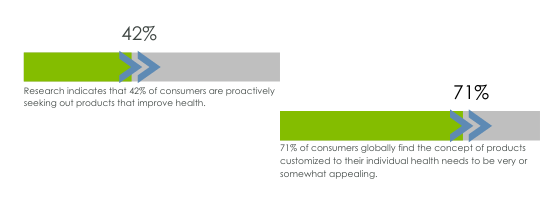Dietary Supplements & Functional Foods: Blurring Lines
What’s the difference between dietary supplements vs. functional foods and beverages? Well, functional foods and beverages are becoming more mainstream every year, with new products being launched that offer consumers a means of obtaining health benefits from the foods and beverages they consume daily. This growing industry, now valued at $253 billion globally, has dramatically increased the choices available to consumers and made functional foods and beverages a standard delivery system for health-enhancing ingredients.

Dietary supplements vs. functional foods and beverages?
However, this growth in the functional foods and beverage market has certainly not curtailed the development of the vitamins and dietary supplements for immune health. Quite the opposite has happened as consumers turn to supplements as an additional means of taking their health and wellbeing into their own hands. An heightened sense of self-reliance and responsibility for managing one’s health has resulted in the evolution of the vitamins and dietary supplements industry and bolstered its growth globally. In fact, global sales of vitamins and dietary supplements were estimated to be $106 billion in 2018 with an average growth of 3.1% forecast from 2018 to 2022. So, what we are seeing is not an either or of diet and supplements, but more of a call for supplemental nutrition via functional ingredients.
Supplementation from functional ingredients.
This growth indicates that vitamins and dietary supplements remain a popular delivery system for health-enhancing ingredients. As a matter of fact, a recent survey from the Council for Responsible Nutrition revealed that 75% of American consumers took dietary supplements in 2018, an increase from 65% in 2009. A growing number of consumers are turning to these products specifically in search of targeted solutions for achieving personalized health benefits.
Boosting immune health.
While supplement products are available in a variety of formats and are positioned to deliver on a broad spectrum of health benefits, it’s clear that immune health, digestive health, bone health, and general health and wellness are the top benefits consumers are seeking from supplements. For manufacturers of supplement products, the opportunity lies in developing premium products with value-added specialty ingredients that can deliver these personalized health benefits.
Quality is the key to creating the best possible supplement product for consumers.
Nutritional and functional ingredients provide the differentiation, premiumization and brand equity that resonates most with consumers. Furthermore, ingredients backed by compelling scientific research will stand out when consumers are browsing crowded shelves looking for products that can deliver the immune health benefits most in tune with their lifestyle. By sourcing the best possible ingredients for your next immune boosting product, you are showing consumers you are dedicated to truly supporting their health and wellness goals.
For a more in-depth look at the dietary supplement industry, including regional market sizes and growth drivers, consumer attitudes, and the differentiation offered by branded ingredients, download our white paper: Dietary Supplements in 2019: A Look at What’s Ahead.

